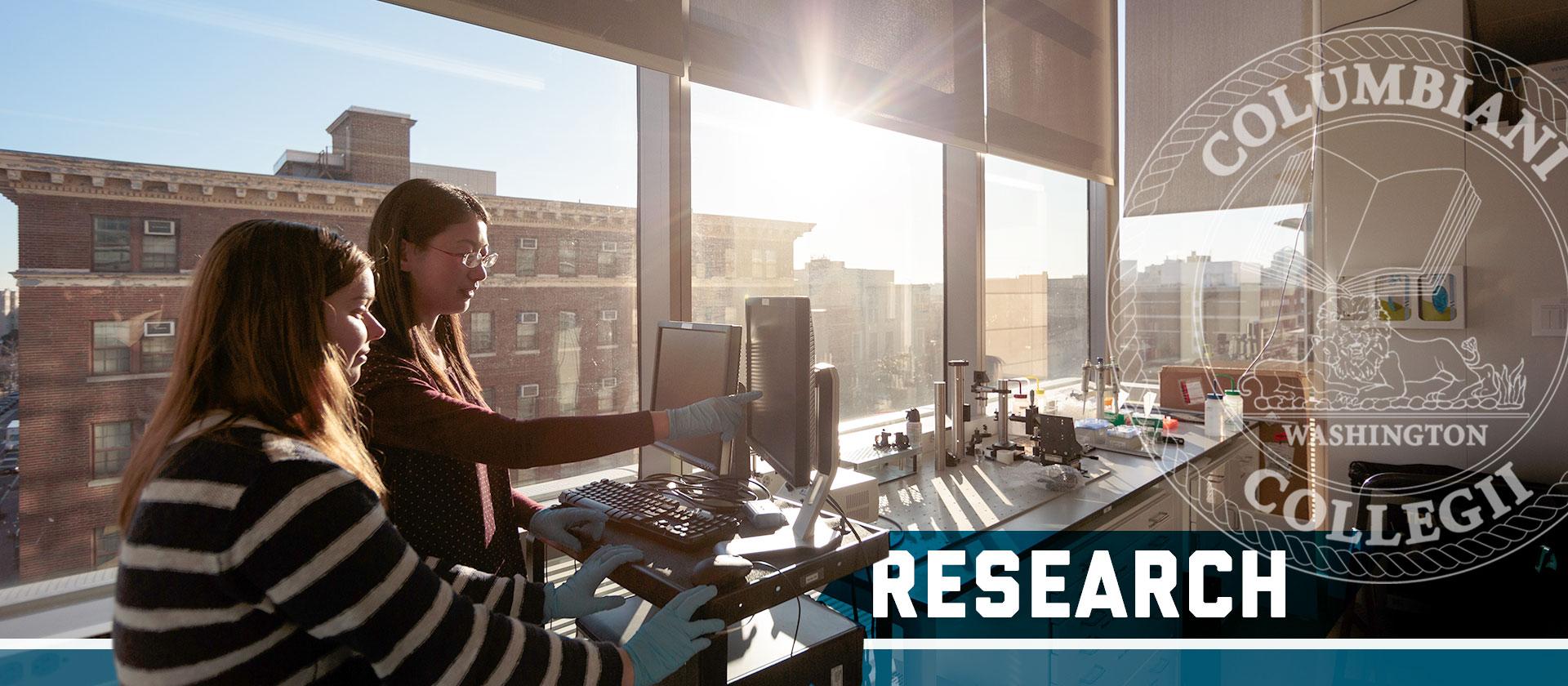Jack Goldstein: All Day Night Sky


At Columbian College, scholars and scientists join student researchers to challenge assumptions and
Advance the forefronts of knowledge.
Discovery and innovation are a Columbian College tradition—from our century-long research partnership with the Smithsonian Institution to our state-of-the-art Science and Engineering Hall. As a member of the prestigious Association of American Universities (AAU), George Washington University is a distinguished leader in global research. Whether our scholars are observing celestial bodies light years from Earth or examining the roots of diseases like tuberculosis and malaria, Columbian College faculty and students are uncovering age-old mysteries and finding solutions to 21st-century challenges.
CCAS research centers
and institutes
annual college research expenditures
permanent full-time faculty members
average annual
faculty media hits

Every day, researchers at GW's Columbian College take on some of the world’s toughest challenges, delivering real-world impact and insights through their relentless pursuit of knowledge and a deeper understanding of our world. From developing technology that advances early disease detection to building trustworthy AI systems and next-generation computer chips, much of their work is made possible through vital federal investments.
With support from the National Institutes of Health, the National Science Foundation, NASA, the Department of Defense and other federal agencies, GW advances medical innovations, fuels economic growth and prepares the next generation of leaders.
Columbian College faculty are prolific authors, awarding-winning scholars, innovators and artists. They are recipients of Guggenheims, Pulitzers and NEH fellowships, and are published in top media outlets and journals.
From labs and classrooms on campus to field sites around the globe, Columbian College students work side-by-side with world-renowned researchers and scholars on a journey of cultural and scientific discovery.
Columbian College is home to top research centers and institutes that explore an array of issues and ideas such as the origins of humankind, the inner workings of the brain and the growth of solar energy.
"Research has definitely broadened what I know about myself and what I want to do in the future. It's really changed my perspective on my career goals, and I'm very excited to keep going on that path now."
Sarah Schrup
BS '19

Understanding Behavioral Development
In a video conversation with Dean Wahlbeck, Cognitive Neuroscience Professor Gabriella Rosenblau discusses how social cognition develops in childhood, particularly for those with autism.

The Ecology of Plant/Animal Interactions
In a video conversation with Dean Wahlbeck, Biology's John Lill discusses the interplay between plants and animals, and the impact of climate change on their coexistence.

‘Wanted!’ Hunt for Lincoln’s Killer Leads Student to Artifact
Anthropology graduate student Isabella Quartiere, BA ’25, is exploring how a John Wilkes Booth wanted poster preserved at GW reflects presidential history.

Understanding Behavioral Development
In a video conversation with Dean Wahlbeck, Cognitive Neuroscience Professor Gabriella Rosenblau discusses how social cognition develops in childhood, particularly for those with autism.

The Ecology of Plant/Animal Interactions
In a video conversation with Dean Wahlbeck, Biology's John Lill discusses the interplay between plants and animals, and the impact of climate change on their coexistence.

Writing Beyond Bars: Student Storytellers Free Incarcerated Voices
In her digital storytelling class, English’s Emma Wu connects GW students and D.C. inmates through a pen pal project for reclaiming memory and humanity.

Black Hole Eats Star: Student Charts Record Blast
Physics PhD student Eliza Neights was part of a NASA mission that recorded a gamma-ray burst, the most powerful class of cosmic explosions, lasting for days.

A Legacy Reconsidered: Native Voices Rewrite America’s Racial Story
In his new book, History Professor David Silverman reframes U.S. racial struggles to spotlight Indigenous identities.
